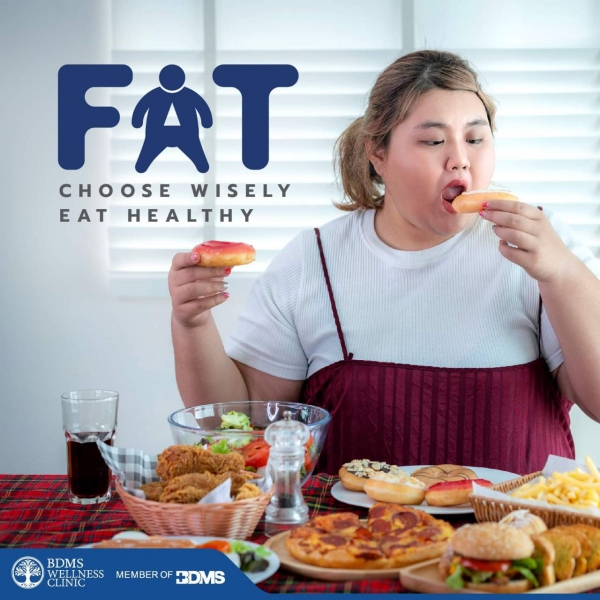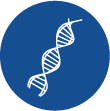Fat Choose Wisely, Eat Healthy
Fat
Choose Wisely, Eat Healthy
Cardiovascular disease is the leading cause of death both in Thailand and globally. Its causes can be induced by one’s behavior and lifestyle. Among them is abnormal blood cholesterol, which results from consumption of foods that are high in fat and cholesterol.
A lot of people try to eat low-fat diets and avoid foods with high cholesterol such as egg yolk, seafood, or offal in the hope of improving their health. However, there is still no apparent decrease in the number of patients with non-communicable diseases (NCDS). These diets are often deficient in "healthy fats” which is crucial for the body.

What Is Fat?
Fat is an essential component for your body. We need dietary fats as an energy source. Fat also helps with the absorption of certain vitamins, makes up a major component of cell and neuronal membrane, as well as contribute to blood coagulation and inflammatory processes.
All fats have similar chemical compositions of carbon and hydrogen. Slight differences in the structure can result in different shapes and biological functions. Fat is divided into three main categories: unsaturated fats, saturated fats and trans fats.
Trans Fats
The worst type of fat detrimental to health is known as trans fats or trans fatty acids are produced in industrial process. Vegetable oils are hydrogenated to solidify and prevent rancidity. Trans fats are often used in processed bakery products and pastries including pizza, croissants, cakes, donuts, cookies and many packaged foods.
Trans fats have serious effects on your health, as they not only increase the level of bad cholesterol like LDL-Cholesterol but also reduce the level of HDL-cholesterol or the good cholesterol as well. Trans fats increase inflammation and contribute to insulin resistance, which is linked to heart disease, type 2 diabetes, and other chronic non-communicable diseases. Consuming trans fats, even in small amounts, is harmful to your health. A study found that a daily intake of 2% trans fats increases the risk of heart disease as much as 23%.
In 2018, Thailand’s Ministry of Public Health issued a notification forbidding the production, import, and sale of foods containing trans fats. However, businesses adapted by switching to full hydrogenation of vegetable oils instead of partial hydrogenation. In other words, they switched from trans fats to saturated fats.
Saturated Fats
Saturated fats are fats whose molecules have no double bond. As a result, they solidify at room temperature (25 degrees Celsius). Saturated fats are found in dairy products, animal fats or oils, coconut oil, palm oil, or fully hydrogenated vegetable oils such as plant-based butter.
Consuming saturated fat can increase the level LDL-cholesterol and in turn the risk of embolism, a factor for stroke and heart disease. The general public is recommended to limit their saturated fats consumption to less than 10% of daily energy intake. However, for high-risk groups or those looking to reduce blood cholesterol levels, the American Heart Association suggests that saturated fats should be limited to 5-6% of daily energy intake or about 11-13 grams (2-3 teaspoons) per 2,000 kcal energy requirement.
To find out the level of saturated fats in your foods, you can read the "nutrition facts label" since manufacturers are required by law to list saturated fat content when their products contain more than 0.5 grams of saturated fat per serving in Thailand.
Unsaturated Fats
A good approach to reduce saturated fats consumption is not to avoid fats altogether but to opt for good fats instead. Those are monounsaturated fats, or Omega 9, found in olive oil, nuts such as peanuts and almonds, canola oil, avocado; and polyunsaturated fats, namely Omega 3, found in fish, flax seeds, canola oil, along with Omega 6 from vegetable oils and seeds.
A research shows that consuming unsaturated fat helps reduce the risk of cardiovascular disease by up to 25%, as well as reduce inflammation, slow down blood clotting and in turn prevent thrombosis, in addition to reducing the risk of dementia.
It is apparent that eating the right fat can help reduce various risk factors that leads to cardiovascular disease. To do so, simply take the following advice:
Foods to embrace
- Opt for good fats from fish, tofu, avocado, nuts such as peanuts, cashews, almonds and choose to cook with olive oil, rice bran oil, or canola oil.
- To avoid saturated fats from meat, choose protein from plant-based diets such as nuts and legumes, tofu, or non-dairy products.
- Embrace whole grains as carbohydrate source, e.g., brown rice and dried beans such as green beans, adlay, red beans, corn, peas, etc.
Foods to avoid
- Avoid saturated fat from fatty cuts of meat, animal fat and processed meat such as sausage, bacon, salami, butter, cheese, full fat milk, coconut oil, palm oil, non-dairy creamer and cream.
- Bakery products such as croissants, donuts, and pizza, as they are rich in butter or margarine.
- Refined carbohydrates, foods high in carbohydrate and sugar content such as white bread, sugar, sweets and pastries.
References
- Dong D.Wang. Association of specific Dietary Fats With Total and Cause-Specific Mortality. JAMA Intern Med. 2016;176(8):1134-1145
- Sacks FM, Lichtenstein AH, Wu JH, Appel LJ, Creager MA, Kris-Etherton PM, et al. Dietary fats and cardiovascular disease: a presidential advisory from the American Heart Association. Circulation. 2017;136(3):e1-e23.
- The National Agricultural Library. USDA Food Composition Databases V.3.8.6.4. United State of America. 2020




